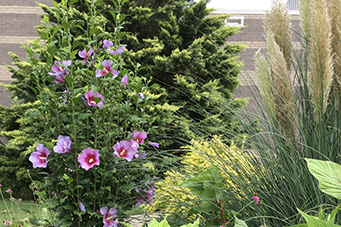| |
UT Gardens August Plant of the Month: Rose-of-Sharon
| |

|
| |
A classic plant, the rose-of-Sharon has stood the test of time. This specimen is at the West Tennessee AgResearch and Education Center. Photo by J. Reeves, courtesy UTIA.
|
When you think of “old school” or “classic plants,” what comes to mind?
In the south many think of their grandmother's hydrangeas, privet hedge, snowball bush (Viburnum), or her rose-of-Sharon. Hibiscus syriacus commonly called rose-of Sharon or althea, is the only woody hibiscus that is hardy north of Zone 8. Native to China and India, it was introduced into the United States. Rose-of-Sharon has stood the test of time for several reasons. Number one is its ability to thrive with virtually no care. That combined with its ease of growing from seed and its dependable blooms, made it a great pass along plant for hundreds of years. It fell out of favor for some time but in recent years there has been a resurgence in new cultivars. Breeders have been developing plants with variegated foliage, double flower and plants that don’t produce seed.
When in full bloom rose-of-Sharon is an absolute show stopper. It is available in a wide range of flower colors including pink, purple, blue, white and near red. Blooms can be single, semi double and double and range in size from 2-5 inches wide. They start flowering in early June and when grown in average to good garden conditions, bloom non-stop until late September. For best flower production they should be grown 6 or more hours of direct sun. Bees and butterflies are attracted to its nectar and the large petals make for a easily landing.
Tolerant of a wide range of soil types, once established rose-of-Sharon is very drought tolerant and will survive without supplemental water except under extreme drought conditions. Hardy to well below 0 °F (Zones 5-9), they respond well to pruning both for regular maintenance and severe “rejuvenating” by pruning to a few inches above the ground. Some gardeners even cut it back each year treating it more like a perennial. This causes the plant to produce many stems and flowers while keeping the plant under a few feet.
One of the newer introductions is a cultivar called Purple Pillar®. Found as a chance seedling in Spain, it made its way to Italy where some Dutch nurserymen saw it and realized its potential. Introduced in 2015 into the United Sates by Spring Meadow Nursery under the Proven Winner’s brand, this cultivar opens up a new world of possibilities for this old world plant.
With a slender columnar growth habit, this cultivar can now be used in areas once deemed too small for the traditional rose-of-Sharon. The industry has been trending toward narrow plants due to the demand from the public looking for plants to fit their small urban gardens. This plant certainly answers the call, showing off its four inches vibrant purple single to semi-double flowers with red centers from top to bottom for months in the toughest of conditions. It screams "look at me”, growing 16 feet tall and only three feet wide. A two year old plant in the UT Gardens, Jackson is five feet tall and 16 inches wide. The pillars of purple flowers reaching to the sky make it a truly unique cultivar begging to be used as a specimen, in a shrub border or large container in your garden.
Anyone can grow rose-of-Sharon in their home garden, a horticulture degree or green thumb is not required. Look for Purple Pillar or other cultivars at your local garden center or at UT Gardens plant sales.
The UT Gardens includes plant collections located in Knoxville, Jackson and Crossville. Designated as the official botanical garden for the State of Tennessee, the collections are part of the UT Institute of Agriculture. The Gardens’ mission is to foster appreciation, education and stewardship of plants through garden displays, educational programs and research trials. The Gardens are open during all seasons and free to the public. For more information, see the Gardens website: ag.tennessee.edu/utg.
The University of Tennessee Institute of Agriculture celebrates 50 years of excellence in providing Real. Life. Solutions. through teaching, discovery and service. ag.tennessee.edu.
Published August 3, 2018 |

